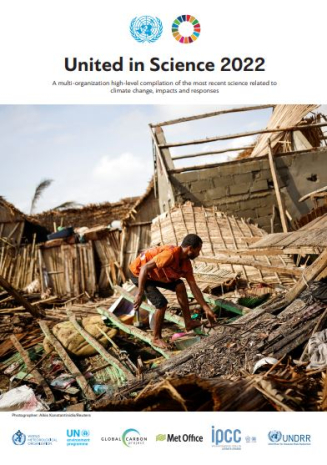United In Science 2022
United In Science 2022: A multi-organization high-level compilation of the most recent science related to climate change, impacts and responses.

This report has been compiled by the World Meteorological Organization (WMO) under the direction of the United Nations Secretary-General to bring together the latest climate science-related updates from key global partner organizations – WMO, Global Carbon Project (GCP), UN Environment Programme (UNEP), Met Office (United Kingdom), Urban Climate Change Research Network (UCCRN), UN Office for Disaster Risk Reduction (UNDRR), World Climate Research Programme (WCRP, jointly sponsored by WMO, IOC-UNESCO and the International Science Council (ISC)) and the Intergovernmental Panel on Climate Change (IPCC). The content of each chapter is attributable to each respective organization.
United in Science provides an overview of the most recent science related to climate change, impacts and responses from the World Meteorological Organization (WMO) and partner organizations. At a time when urgent action to address climate change is needed, the report provides unified scientific information to inform decision-makers and highlights some of the physical and socioeconomic impacts of the current and projected climate.
The UN Environment Programme’s latest Emissions Gap Report found that the full implementation of mitigation pledges made by countries (as of 4 November 2021) is insufficient and will not keep global warming below 1.5 °C above pre-industrial levels. The report also found that the ambition of these pledges would need to be four times higher to keep global temperature rise below 2 °C above pre-industrial levels and seven times higher to limit warming to 1.5 °C. Enhanced mitigation action is needed to prevent the goals of the Paris Agreement from slipping out of reach.
Without ambitious action, the physical and socioeconomic impacts of climate change will be devastating. Irreversible physical changes in the climate system, known as tipping points, can not be ruleld out and could have significant global and regional consequences. According to the Urban Climate Change Research Network, cities – responsible for up to 70% of human-caused emissions – will face increasing climate impacts that will intersect with socioeconomic inequalities. Additionally, the WMO World Weather Research Programme highlights that it is the world’s most vulnerable populations that will suffer the most, as has already been observed during recent extreme weather events.
Log in with your EU Login account to post or comment on the platform.